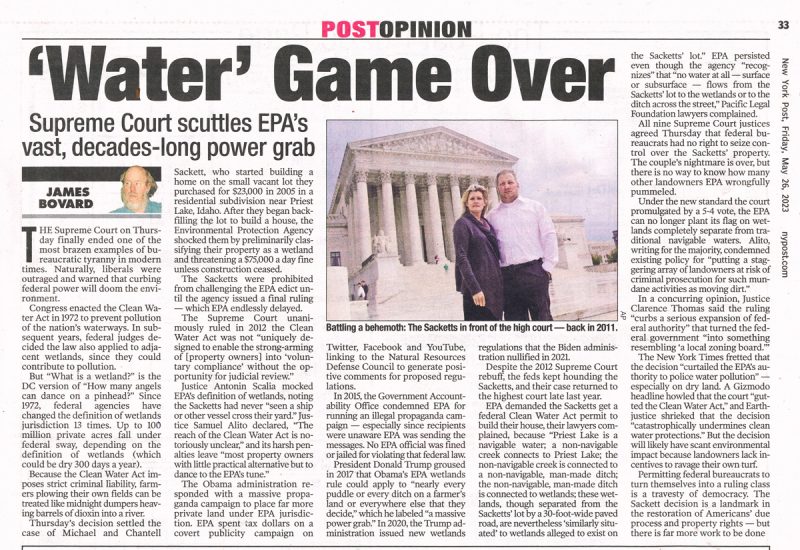New York Post, May 26, 2023
Supreme Court strikes blow against bureaucratic tyranny in EPA case
The Supreme Court on Thursday finally ended one of the most brazen examples of bureaucratic tyranny in modern times. Naturally, liberals were outraged and warned that curbing federal power will doom the environment.
Congress enacted the Clean Water Act in 1972 to prevent pollution of the nation’s waterways. In subsequent years, federal judges decided the law also applied to adjacent wetlands, since they could contribute to pollution.
But “What is a wetland?” is the DC version of “How many angels can dance on a pinhead?” Since 1972, federal agencies have changed the definition of wetlands jurisdiction 13 times. Up to 100 million private acres fall under federal sway, depending on the definition of wetlands (which could be dry 300 days a year). Because the Clean Water Act imposes strict criminal liability, farmers plowing their own fields can be treated like midnight dumpers heaving barrels of dioxin into a river.
Thursday’s decision settled the case of Michael and Chantell Sackett, who started building a home on the small vacant lot they purchased for $23,000 in 2005 in a residential subdivision near Priest Lake, Idaho. After they began backfilling the lot to build a house, the Environmental Protection Agency shocked them by preliminarily classifying their property as a wetland and threatening a $ 75,000-a-day fine unless construction ceased. The Sacketts were prohibited from challenging the EPA edict until the agency issued a final ruling — which EPA endlessly delayed.
The Supreme Court unanimously ruled in 2012 the Clean Water Act was not “uniquely designed to enable the strong-arming of [property owners] into ‘voluntary compliance’ without the opportunity for judicial review.’’ Justice Antonin Scalia mocked EPA’s definition of wetlands, noting the Sacketts had never “seen a ship or other vessel cross their yard.” Justice Samuel Alito declared, “The reach of the Clean Water Act is notoriously unclear,” and its harsh penalties leave “most property owners with little practical alternative but to dance to the EPA’s tune.”
The Obama administration responded with a massive propaganda campaign to place far more private land under EPA jurisdiction. EPA spent tax dollars on a covert publicity campaign on Twitter, Facebook and YouTube, linking to the Natural Resources Defense Council to generate positive comments for proposed regulations. In 2015, the Government Accountability Office condemned EPA for running an illegal propaganda campaign — especially since recipients were unaware EPA was sending the messages. No EPA official was fined or jailed for violating that federal law.
President Donald Trump groused in 2017 that Obama’s EPA wetlands rule could apply to “nearly every puddle or every ditch on a farmer’s land or everywhere else that they decide,” which he labeled “a massive power grab.” In 2020, the Trump administration issued new wetlands regulations that the Biden administration nullified in 2021.
Despite the 2012 Supreme Court rebuff, the feds kept hounding the Sacketts, and their case returned to the highest court late last year. EPA demanded the Sacketts get a federal Clean Water Act permit to build their house, their lawyers complained, because “Priest Lake is a navigable water; a non-navigable creek connects to Priest Lake; the non-navigable creek is connected to a non-navigable, man-made ditch; the non-navigable, man-made ditch is connected to wetlands; these wetlands, though separated from the Sacketts’ lot by a 30-foot-wide paved road, are nevertheless ‘similarly situated’ to wetlands alleged to exist on the Sacketts’ lot.”
EPA persisted even though the agency “recognizes” that “no water at all — surface or subsurface — flows from the Sacketts’ lot to the wetlands or to the ditch across the street,” Pacific Legal Foundation lawyers complained.
All nine Supreme Court justices agreed Thursday that federal bureaucrats had no right to seize control over the Sacketts’ property.
The couple’s nightmare is over, but there is no way to know how many other landowners EPA wrongfully pummeled.
Under the new standard the court promulgated by a 5-4 vote, the EPA can no longer plant its flag on wetlands completely separate from traditional navigable waters.
Alito, writing for the majority, condemned the existing policy for “putting a staggering array of landowners at risk of criminal prosecution for such mundane activities as moving dirt.”
In a concurring opinion, Justice Clarence Thomas said the ruling “curbs a serious expansion of federal authority” that turned the federal government “into something resembling ‘a local zoning board.’”
The New York Times fretted that the decision “curtailed the EPA’s authority to police water pollution” — especially on dry land.
A Gizmodo headline howled that the court “gutted the Clean Water Act,” and Earthjustice shrieked that the decision “catastrophically undermines clean water protections.”
But the decision will likely have scant environmental impact because landowners lack incentives to ravage their own turf.
Permitting federal bureaucrats to turn themselves into a ruling class is a travesty of democracy. The Sackett decision is a landmark in the restoration of Americans’ due process and property rights — but there is far more work to be done.
James Bovard is the author of 10 books and a member of the USA Today Board of Contributors.

My underwear has become a wetland in my old age. I expect the EPA to send a “Cease and Desist” order to my penis any day now.
PS: Jim, feel free to use the joke anytime.
Yay! The courts haven’t (yet) completely lost their minds.
“The Sacketts were prohibited from challenging the EPA edict until the agency issued a final ruling — which EPA endlessly delayed.”
This kind of government-enforced waste-by-inertia is difficult to measure but is a gigantic millstone around the necks of the populace. That’s on top of paying the salaries of the people imposing the endless bureaucratic morasses.
JdL: Have you noticed that nowadays the bureaucrats only use their first names in communications with the public? They don’t want us to know their last names or where they live.